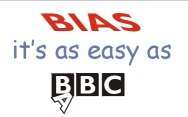Why We Must Pay More For The Biased BBC
 THE BBC does much good, and much indifferent or bad. But does that make it different to any other broadcaster? Here are two views on the huge corporation that stymies media competition and that if you want to watch telly legally in the UK you have to fund:
THE BBC does much good, and much indifferent or bad. But does that make it different to any other broadcaster? Here are two views on the huge corporation that stymies media competition and that if you want to watch telly legally in the UK you have to fund:
Let’s start with the good news. The BBC works. For just £2.60 a week, the British get a package of the best television and radio in the world. We get the best comedies, the best drama and the best news. There’s a reason why we have won seven of the past 10 international Emmies, and the BBC News website is the most popular on earth. As soon as he took power, Nicolas Sarkozy asked how he could make French broadcasting more like ours. It is a model for the world of how to create journalism that isn’t contaminated by either corporate advertisers and proprietors on one side, or state ownership on the other. Three independent polls have found that a large majority of Brits would happily pay more for it.
Here’s Peter Sissons, the BBC newsreader:
Peter Sissons, the retired BBC news presenter, last night attacked the corporation for paying huge executive salaries while allowing BBC newsrooms to become “factories” run by “poor kids”. The presenter, who left the BBC during the summer, also said that there was far too much opinion on BBC news programmes, and not enough straight reporting of facts.
Sissons, 67, who is writing an autobiography covering his career first at ITN, where he was happiest, then from 1989 at the BBC, told a Media Society dinner last night that the huge gulf between the salaries paid to the top tier at the BBC and everyone else was a real problem, especially in the 24-hour newsroom at BBC Television Centre…
“And then there are these panjandrums on huge numbers. If you tried to devise a way of undermining morale, you couldn’t find a better way. They [top executives] are working in the public service, and all this is taking place after we’ve found MPs with their snouts in the trough. Public service is taking second place to their pecuniary interests.”
Sissons also criticised the growing tendency of BBC journalists to offer analysis and opinion on news stories. “I say go back to basics. Report on the news,” he said. “The term reporter is the noblest word in the language, not this term ‘correspondent’. Increasingly, reporters are being invited by presenters to give their opinion. Far too much opinion is creeping into news reporting, with pay-off lines, to steer the viewer into what to think. Let them make up their own minds on the facts.”
He makes a good point – if the newsreaders are not telling you what to think by widening and narrowing their eyes like a nursey school teacher reading the Big Bad Wolf, the news is shaped by an agenda.
Two questions: who made Israel the BBC’s lead news story? And why?,
Spotter: Biased BBC
Posted: 2nd, October 2009 | In: Reviews Comment | TrackBack | Permalink


